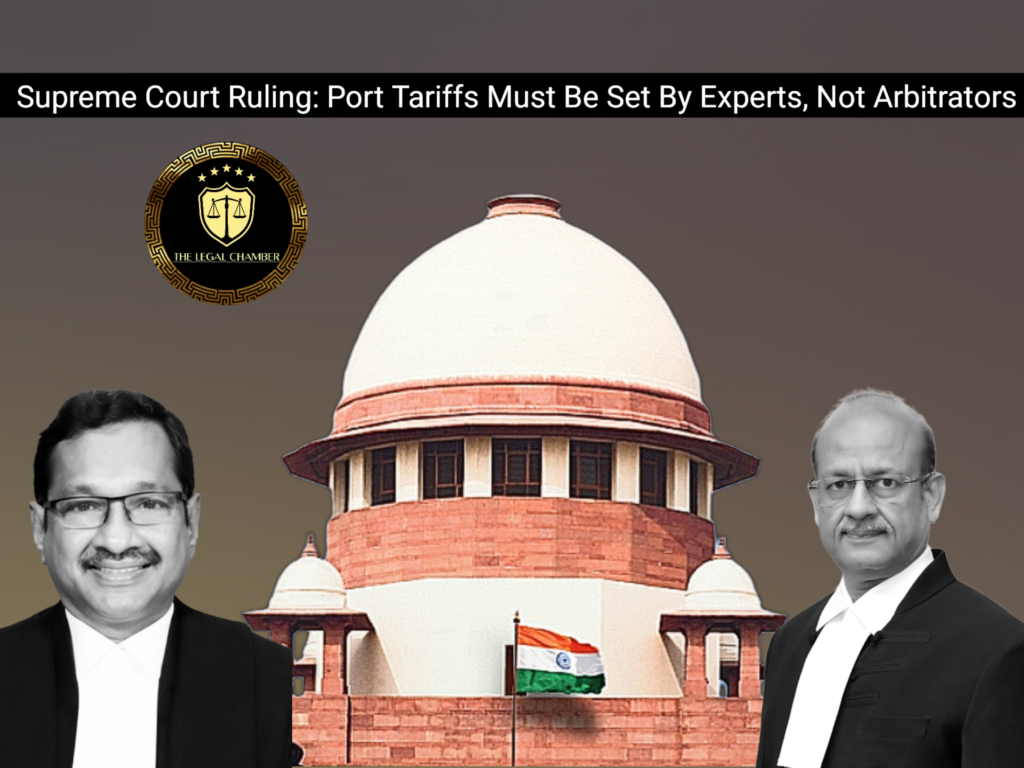
The Supreme Court held that tariff fixation for port facilities is a technical and expert-driven function, best adjudicated by specialized bodies like TAMP. It emphasized that contractual agreements cannot override statutory tariff-setting mechanisms under the Major Port Authorities Act, 2021. The Court remanded the matter to TAMP for fresh determination, underscoring the need for expert appraisal of tariff revisions and compliance with natural justice.
Facts Of The Case:
A bilateral agreement was executed in 1985 between Paradip Port Trust (now Authority) and Paradeep Phosphates Ltd. (PPL), then a public sector unit, for the exclusive use of a captive fertilizer berth. The agreement stipulated a tariff schedule, with a clause for future mutual enhancement. In 1993, the Port unilaterally revised the tariff by issuing a notification under the Major Port Trusts Act, 1963, which PPL paid under protest for years. In 2000, PPL filed a civil suit challenging this unilateral revision. As both parties were public sector units, they subsequently entered a supplementary agreement for informal arbitration. The arbitrator, and later the appellate authority, held the tariff revision from 1993 to 1999 was invalid and ordered a refund, directing the parties to approach the Tariff Authority for Major Ports (TAMP) for the subsequent period. The Port’s challenge to this award was dismissed by the High Court. A parallel dispute involved a separate TAMP order that rejected the Port’s tariff revision proposal for a later period (1999-2010). Both the arbitral award and the TAMP order were concurrently challenged before the Supreme Court.
Procedural History:
The dispute originated with a civil suit filed by the respondent in 2000 challenging the appellant’s unilateral tariff revision. The parties, then both public sector units, subsequently entered into a supplementary arbitration agreement. An arbitrator was appointed, who passed an award in 2002 against the appellant. The appellant challenged this award before a designated Appellate Authority, which dismissed the appeal in 2009. The appellant then filed a writ petition before the High Court, which was dismissed in 2023, upholding the arbitral award and the appellate order. A separate proceeding involved a direct challenge to an order of the Tariff Authority for Major Ports (TAMP) before the High Court, which was also dismissed. The appellant then filed two special leave petitions before the Supreme Court, which were granted leave and heard together as civil appeals, culminating in the present judgment.
READ ALSO:Supreme Court Returns Children to Adoptive Parents, Prioritizes Family Bonds Over Procedure
Court Observation:
The Court observed that an agreement between parties cannot override statutory provisions for tariff fixation. It held that the function of determining port tariffs is a highly technical and expert-driven exercise, falling within the exclusive domain of specialized bodies like the Tariff Authority for Major Ports (TAMP). The Arbitrator and the Appellate Authority had erroneously adjudicated what was essentially a technical tariff dispute, a task for which they lacked the requisite expertise. The Court further found a violation of natural justice, as TAMP had denied a meaningful oral hearing despite the complex factual and accounting issues involved. Consequently, the arbitral award and the subsequent High Court order upholding it were set aside, and the matter was remanded to TAMP for a fresh determination on the merits.
Final Decision & Judgement:
The Supreme Court set aside the arbitral award, the order of the Appellate Authority, and the impugned judgment of the High Court. It also set aside the separate order of the TAMP pertaining to a subsequent tariff period. The Court remanded all issues concerning the revision of port tariffs, for the periods from October 1993 to March 1999 and from April 1999 onwards, back to the Tariff Authority for Major Ports (TAMP) for a fresh determination. The Court mandated that TAMP must afford both parties a full opportunity of hearing and examine all issues, including limitation, on their merits. Additionally, the Court issued a significant recommendation, urging the Union Government to constitute an expert appellate body to hear appeals against TAMP’s orders, instead of the current provision for direct appeals to the Supreme Court.
Case Details:
Case Title:Paradip Port Authority vs. Paradeep Phosphates Ltd. Citation: 2025 INSC 971 Appeal Number: Civil Appeal No. 10542 of 2025 Date of Judgement: August 12, 2025 Judges/Justice Name: Justice M.M. Sundresh and Justice Rajesh Bindal
Download The Judgement Here